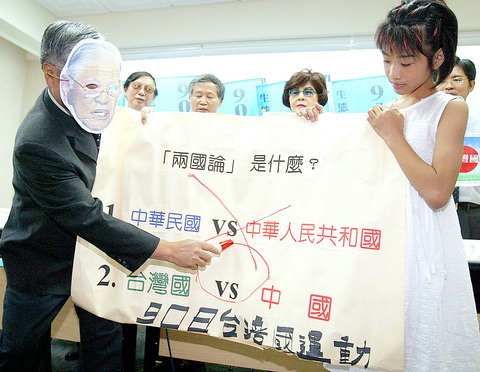Taiwan has been an independent state for 54 years and its title should be the Taiwan Republic, a pro-independence organization said yesterday.
"We are calling on the opposition parties not to embrace the thighs of [fawn over] China, and for the Democratic Progressive Party [DPP] government not to espouse the `Republic of China,'" said Peter Wang (王獻極), convener of the 908 Taiwan Republic Campaign.
Wang was speaking during a press conference marking the sixth anniversary of the "special state-to-state" dictum introduced by former president Lee Teng-hui (

PHOTO: WANG YIH-SUNG, TAIPEI TIMES
"The theory may be a small step for the former president, but it is a giant step for the Taiwan Republic and the two states refer to China and Taiwan Republic rather than China and Republic of China," Wang said. "We are dedicated to following in his footsteps and calling on the 23 million people of Taiwan to jointly accomplish the historic mission of changing the country's name to Taiwan."
Wang announced that his group would hold a flag-raising ceremony for the Taiwan Republic at 9am on Sept. 8 on Ketagelan Boulevard to celebrate the 54th anniversary of the inking of the San Francisco Peace Treaty to raise public awareness of the nation's identity.
"Taiwan became independent on Sept. 8, 1951, when 49 UN members signed the San Francisco Peace Treaty, in which the Japanese empire renounced its sovereignty over Taiwan after its defeat in World War II," Wang said. "The name of the country should be the Taiwan Republic and nothing else."
A candlelight gathering is planned for 7pm on the same day at Manka Park across from Lungshan Temple in Taipei City's Wanhua (萬華) District. Organizers hope to see a turnout of about 1,000 people at the flag-raising ceremony and 2,000 people at the evening event.
The group's short and long-term goals, Wang said, are to hold an inspection of the armed forces of the Taiwan Republic on Ketagelan Boulevard on the 55th anniversary of the peace accord next year and to see the president of the Taiwan Republic sign into law the Taiwan Republic Constitution on the day of his or her inauguration on May 20, 2008.
Among those supporting the group's goals are Presidential Office national policy adviser and lawyer Chuang Po-lin (莊柏林), DPP Legislator Wang To-far (王塗發) and campaign co-organizer Wang Li-tsu (王麗子).
Chuang said that China's "one-China" rhetoric has seriously jeopardized Taiwan's national interest and social security.
"Without extradition codes, we cannot bring back culprits committing hideous crimes here who elude the law by escaping overseas," he said. "With the `one-China' policy in place, China has been telling other countries to deal with them, not us, because they claim sovereignty over us."
Although Taiwan is already an independent, sovereign state, Wang To-far said that its biggest problem lies in the lack of a national identity.

MAKING WAVES: China’s maritime militia could become a nontraditional threat in war, clogging up shipping lanes to prevent US or Japanese intervention, a report said About 1,900 Chinese ships flying flags of convenience and fishing vessels that participated in China’s military exercises around Taiwan last month and in January last year have been listed for monitoring, Coast Guard Administration (CGA) Deputy Director-General Hsieh Ching-chin (謝慶欽) said yesterday. Following amendments to the Commercial Port Act (商港法) and the Law of Ships (船舶法) last month, the CGA can designate possible berthing areas or deny ports of call for vessels suspected of loitering around areas where undersea cables can be accessed, Oceans Affairs Council Minister Kuan Bi-ling (管碧玲) said. The list of suspected ships, originally 300, had risen to about

DAREDEVIL: Honnold said it had always been a dream of his to climb Taipei 101, while a Netflix producer said the skyscraper was ‘a real icon of this country’ US climber Alex Honnold yesterday took on Taiwan’s tallest building, becoming the first person to scale Taipei 101 without a rope, harness or safety net. Hundreds of spectators gathered at the base of the 101-story skyscraper to watch Honnold, 40, embark on his daredevil feat, which was also broadcast live on Netflix. Dressed in a red T-shirt and yellow custom-made climbing shoes, Honnold swiftly moved up the southeast face of the glass and steel building. At one point, he stepped onto a platform midway up to wave down at fans and onlookers who were taking photos. People watching from inside

Japan’s strategic alliance with the US would collapse if Tokyo were to turn away from a conflict in Taiwan, Japanese Prime Minister Sanae Takaichi said yesterday, but distanced herself from previous comments that suggested a possible military response in such an event. Takaichi expressed her latest views on a nationally broadcast TV program late on Monday, where an opposition party leader criticized her for igniting tensions with China with the earlier remarks. Ties between Japan and China have sunk to the worst level in years after Takaichi said in November that a hypothetical Chinese attack on Taiwan could bring about a Japanese

STREAMLINED: The dedicated funding would allow the US to transfer equipment to Taiwan when needed and order upgraded replacements for stockpiles, a source said The US House of Representatives on Thursday passed a defense appropriations bill totaling US$838.7 billion, of which US$1 billion is to be allocated to reinforcing security cooperation with Taiwan and US$150 million to replace defense articles provided to the nation. These are part of the Consolidated Appropriation Act, which the US House yesterday passed with 341 votes in favor and 88 against. The act must be passed by the US Senate before Friday next week to avoid another government shutdown. The US House Committee on Appropriations on Monday unveiled the act, saying that it allocates US$1 billion for the Taiwan Security Cooperation Initiative